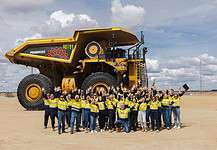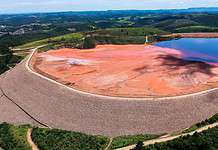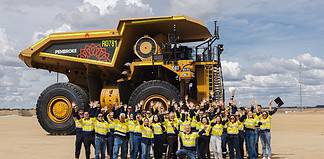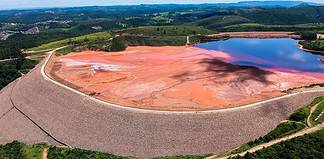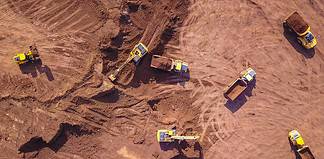 AUSTRALIA’S sluggish resources sector is one of the rare winners from a largely austere 2014 to 2015 Federal Budget, as the Abbott Government maps a course toward achieving a budget surplus by the end of the decade.
AUSTRALIA’S sluggish resources sector is one of the rare winners from a largely austere 2014 to 2015 Federal Budget, as the Abbott Government maps a course toward achieving a budget surplus by the end of the decade.
A reiterated pledge to remove the carbon and mineral resources rent taxes was accompanied by a 1.5 per cent company tax cut, generous exploration incentives, and cuts to existing red and green tape. The diesel fuel tax rebate scheme would also remain.
Association of Mining and Exploration Companies chief executive Simon Bennison called the Budget “sensible”, and said restoring Australia’s reputation for investment in mining and exploration would be a crucial outcome.
The Exploration Development Incentive (EDI) – introduced from 1 July – is designed to arrest plummeting investment in junior explorers undertaking greenfields minera exploration in Australia. The EDI would be capped at $100 million for an initial three-year term, to be reviewed every year.
“The EDI will go a long way towards addressing low new discovery rates, an ongoing reduction in Australian greenfield exploration activities and a low number of initial public offerings for mineral projects in Australia,” Mr Bennison said.
“It will help Australia to regain international competitiveness and increase its share of global exploration expenditure.
“We need to be encouraging additional long term investment in the mining sector to promote growth and productivity, and let the industry get on with business to ‘grow the pie’.”
Mr Bennison called the proposed company tax rate reduction a “positive message to industry” that would provide much needed business and investment confidence. From 1 July 2015 the company tax rate could be reduced from 30 per cent to 28.5 per cent for about 800,000 businesses. However, this could be offset by the proposed parental leave levy of 1.5 per cent for companies earning more than $5 million per annum.
Despite calls to eliminate diesel fuel tax credit arrangements, the government retained the $5.5 billion diesel fuel tax rebate scheme that has applied for ‘off road use’ in the agriculture, forestry, fishing and mining industries for decades. Retention of this benefit would be partially offset by a $2.4 billion rise in petrol excise, which would lead to an overall increase in fuel costs.
A Budget analysis by KPMG indicated that while the impact on business was expected to be minimal, as fuel tax credit entitlements remained in place, there would be exceptions. “However, business importing and manufacturing alternative fuels, or using alternative fuel blends, should consider whether the changes will impact the longer term pricing of those blends due to the loss of grants and subsidies,” the report stated.
The Budget also flagged a 1.5 per cent cut to the research and development (R&D) tax offset from 1 July. For large companies, this would represent a 15 per cent reduction in the relative tax savings for their 2015 year R&D claims.
“[However], not withstanding the slight reduction in the headline rate for R&D, the incentive still provides permanent tax savings and timing benefits,” KPMG reported. Further budget related initiatives would reduce red tape, improveefficiency and reduce duplication in environmental approvals, including the implementation of a ‘one stop shop’ for environmental approvals, that would eliminate duplicated processes between the Federal Government and respective state and territory governments.
This focus on rebuilding Australia’s competitiveness would be an essential element of a pro-growth strategy in medium term, according to Mineral Council of Australia chief executive Brendan Pearson. Mr Pearson voiced support for the Budget, but said he was disappointed by the $460 million cutback in low emissions coal technologies investment, including carbon capture and storage.
Funding has been reduced for the National Low Emissions Coal Initiative, which helped companies develop and deploy technology to reduce emissions from coal use; although funding of $96.6 million across four years would remain available.
“This is disappointing, but Australia’s coal sector remains committed to investing in the development and deployment of technologies that substantially reduce coal’s carbon footprint,” Mr Pearson said. For younger workers the Australian Apprenticeships Incentives Program – Tools for your Trade would finish, although the government pledged to provide apprentices with concessional Trade Support Loans of up to $20,000 during a four year apprenticeship from July this year.
The Australian Council of Trade Unions slammed the government for failing to invest in industry and innovation or outline a plan for the jobs of the future. “Mr Abbott said he would create one million new jobs – instead today he has flagged cutting 16,500 public servants and has ripped hundreds of millions out of skills and innovation,” ACTU president Ged Kearney said after details of the Budget were released.
“This budget cuts over half a billion in support for skills including apprentices and it cuts around $360 million in support for innovation.
“This leaves workers and communities impacted by recent closures without sufficient support and it provides no new vision or support for jobs or industry of the future.” Construction, Forestry, Mining and Energy Union spokesman Steve Smyth told the ABC that the budget had been kind to the mining industry, and he hoped the benefits would trickle down to workers.
“I hope the flow-on from it flows down to obviously people within the industry I represent and Australians generally,” he said. “Obviously as long as the industry keep prospering and workers keep continuing to be employed, then that can be a positive step in that industry.”


